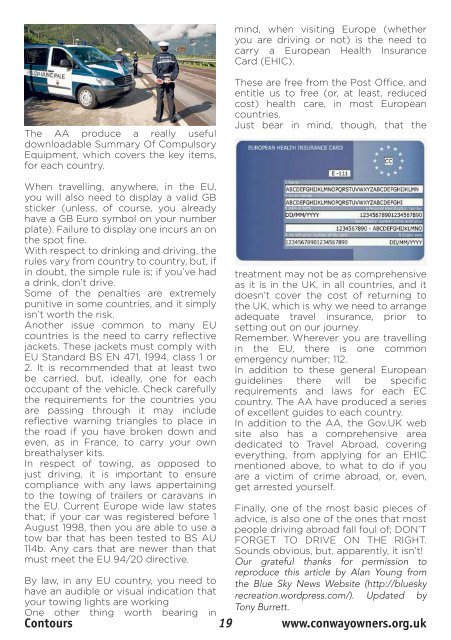Contours May 2017
Create successful ePaper yourself
Turn your PDF publications into a flip-book with our unique Google optimized e-Paper software.
mind, when visiting Europe (whether<br />
you are driving or not) is the need to<br />
carry a European Health Insurance<br />
Card (EHIC).<br />
The AA produce a really useful<br />
downloadable Summary Of Compulsory<br />
Equipment, which covers the key items,<br />
for each country.<br />
These are free from the Post Office, and<br />
entitle us to free (or, at least, reduced<br />
cost) health care, in most European<br />
countries.<br />
Just bear in mind, though, that the<br />
When travelling, anywhere, in the EU,<br />
you will also need to display a valid GB<br />
sticker (unless, of course, you already<br />
have a GB Euro symbol on your number<br />
plate). Failure to display one incurs an on<br />
the spot fine.<br />
With respect to drinking and driving, the<br />
rules vary from country to country, but, if<br />
in doubt, the simple rule is; if you’ve had<br />
a drink, don’t drive.<br />
Some of the penalties are extremely<br />
punitive in some countries, and it simply<br />
isn’t worth the risk.<br />
Another issue common to many EU<br />
countries is the need to carry reflective<br />
jackets. These jackets must comply with<br />
EU Standard BS EN 471, 1994, class 1 or<br />
2. It is recommended that at least two<br />
be carried, but, ideally, one for each<br />
occupant of the vehicle. Check carefully<br />
the requirements for the countries you<br />
are passing through it may include<br />
reflective warning triangles to place in<br />
the road if you have broken down and<br />
even, as in France, to carry your own<br />
breathalyser kits.<br />
In respect of towing, as opposed to<br />
just driving, it is important to ensure<br />
compliance with any laws appertaining<br />
to the towing of trailers or caravans in<br />
the EU. Current Europe wide law states<br />
that; if your car was registered before 1<br />
August 1998, then you are able to use a<br />
tow bar that has been tested to BS AU<br />
114b. Any cars that are newer than that<br />
must meet the EU 94/20 directive.<br />
By law, in any EU country, you need to<br />
have an audible or visual indication that<br />
your towing lights are working<br />
One other thing worth bearing in<br />
<strong>Contours</strong><br />
19<br />
treatment may not be as comprehensive<br />
as it is in the UK, in all countries, and it<br />
doesn’t cover the cost of returning to<br />
the UK, which is why we need to arrange<br />
adequate travel insurance, prior to<br />
setting out on our journey.<br />
Remember. Wherever you are travelling<br />
in the EU, there is one common<br />
emergency number; 112.<br />
In addition to these general European<br />
guidelines there will be specific<br />
requirements and laws for each EC<br />
country. The AA have produced a series<br />
of excellent guides to each country.<br />
In addition to the AA, the Gov.UK web<br />
site also has a comprehensive area<br />
dedicated to Travel Abroad, covering<br />
everything, from applying for an EHIC<br />
mentioned above, to what to do if you<br />
are a victim of crime abroad, or, even,<br />
get arrested yourself.<br />
Finally, one of the most basic pieces of<br />
advice, is also one of the ones that most<br />
people driving abroad fall foul of; DON’T<br />
FORGET TO DRIVE ON THE RIGHT.<br />
Sounds obvious, but, apparently, it isn’t!<br />
Our grateful thanks for permission to<br />
reproduce this article by Alan Young from<br />
the Blue Sky News Website (http://bluesky<br />
recreation.wordpress.com/). Updated by<br />
Tony Burrett.<br />
www.conwayowners.org.uk


